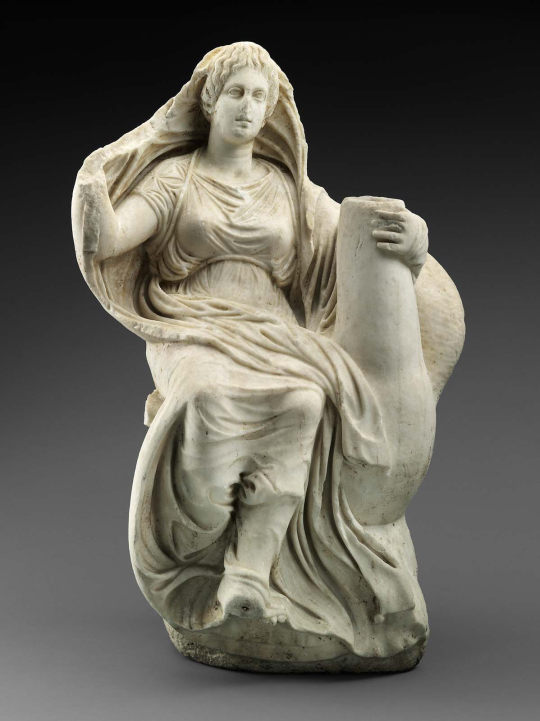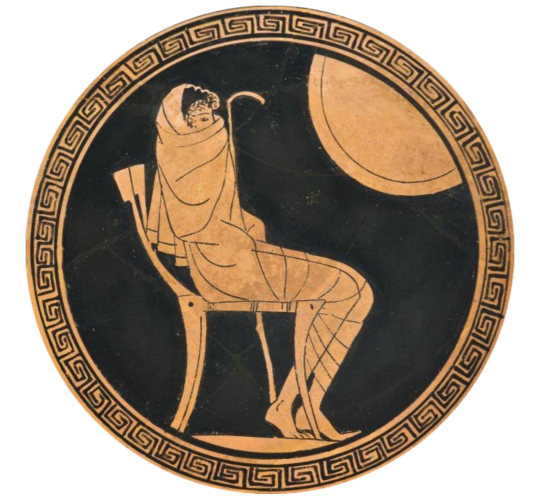Note
Hi I realise that this probably isn’t the kind of ask that you usually get but I’ve been wanting to get into Hellenic polytheism for a little while now but have no idea where to start. Are there certain books or texts I should read? Are there values or rules I should know to follow? do I need to be of a specific nationality or worship specific gods within the religion? How do I pray and make altars? Are there specific clothing garments that should be worn?
again I’m sorry for the bombardment of questions but I have been scouring the internet looking for how best to go about this and have found nothing so I thought it would just be best to ask someone.
thank you in advance if you do end up answering this but if you don’t that’s understandable and thank you anyway :)
Hi there! It's alright. I'm open to all sorts of asks and happy to help!
Before we get into it, I'll be talking about some things that might be quite traditional, things I use as someone who relies on historical accuracy in my practice to a certain degree. You don't need to strictly do everything like the ancients did. If you'd like to reconstruct in your practice that's awesome. I know from my own experience that it can be difficult at first, so don't be too hard on yourself if you can't do something. It takes time, patience and a lot of learning.
Texts
IMO the basics are The Iliad, The Odyssey, Theogony, Homeric Hymns and such.
Theoi.com is a fantastic resource for myths, cults, and historical information on the gods. The website has a library where you can find plenty of classical texts.
Here's my post on how mythology applies to religion. I'd like to edit it soon and add a couple things but maybe you'll find it helpful.
These also might be helpful:
Perseus Digital Library
Sacred Texts - classics
What to avoid:
Hellenic Online Groups/Forums to Avoid
Authors to Watch Out For in Hellenismos

Rules
You don't need to be of a specific nationality, ethnicity or come from a specific background. It's an open religion, meaning everyone's welcome regardless of where they come from!
There is no one specific strict set of rules one needs to follow in order to be a Hellenic Polytheist. There are certain customs, for example when it comes to worship and of course, remember to learn and respect the culture and the tradition.
If we observe the history, there are things that might seem like some form of rules but it didn't just regard the religion. It was also about functioning in the ancient society and religion played an important role in said society. Not all of these rules may be applicable nowadays, though and they could vary in different regions.
Some of them include:
Don't violate Xenia
Stay true to your oaths
Don't allow Agos
Don't abuse supplicants
Stand against murder
Bury the dead
Try to approach the gods while washed
Obey sacred laws (they varied depending on the sanctuary)
Respect Pythia
Do not steal from temples
Now, in the modern-day reconstruction of the Ancient Greek religion, these are the so-called Pillars of Hellenismos:
Ethike Arête - the practice of habitual excellence
Eusebia - reverence, loyalty, and sense of duty toward the Gods
Hagneia - the maintaining of ritual purity by avoiding miasma
Nomos Arkhaios - observance of ancient tradition, (religious) law, and customs
Sophia - the pursuit of wisdom, understanding, and truth
Sophrosune - the control of self through deep contemplation
Xenia - adherence to hospitality and the guest-host relationship
It's more of a modern thing created for the purpose of reconstruction and has its origins in philosophy. They're pretty much the ideals the ancients admired and strived for, which can be mirrored in one's practice. I think they can be quite helpful. Not everyone follows the same pillars, however. They may vary depending on the practitioner.

Prayer & altar space
Your altar can be as extra or as simple as you want. Essentially, it's a space you dedicate to the gods. The altar doesn't need to be super big or too fancy. It's up to you. You can have one altar for multiple gods or a general home altar. It's quite practical. You can also have separate altars to the deities of your choice but that's not a requirement. For example, I have a general altar for Theoi where I normally pray and make offerings and separate altars for my patrons.
Some "basic" elements an altar could include are:
Candles
Something to burn the incense
A place for the offerings, e.g. a plate/bowl
A depiction of the deity, e.g. a statue, drawing, image
Something that reminds you of the, e.g. their symbols
You don't need to spend a fortune. Handmade things are always a good way to honour the gods.
If you need to practice in secret you could make a "hidden" altar. I mentioned it here: LINK
When it comes to prayer, traditionally there are some customs depending on the deity:
When praying to Ouranic [heavenly] Gods, one should stand with hands outstretched in the air and palms facing upward
When praying to Chthonic [underworld] Gods, hands mustn’t be raised, and the prayer should be murmured
When praying to Einalic [sea] Gods, Nymphs and spirits of the earth, arms must be spread wide towards the sea; the hands are also be facing the cult image
You can pray out loud or silently, though. I often do it "in my head" whenever I can't do it out loud.
One more important thing. I won't ramble about it here but here's a great post about purification and miasma: LINK

Getting dressed
It's not required to wear a certain type of clothing however, if you're down for something like that veiling could be an option. Its purpose was to exhibit modesty. It was a common practice among women but it was not exclusive to them, men did veil as well.
It's a good way to honour Hestia, for example as she's known to wear a veil herself.
Here's an amazing post about it listing different styles: LINK

The most well know form of veiling involved using Himation, a rectangular cloak or shawl wrapped around the body and thrown over the left shoulder, like on the picture above but a more simple way to veil could even be wearing a beanie.

Or... you could always do it Achilles' way lmao! ↑ Whatever floats your boat!
Additional links
Here are some posts that might be useful:
Hellenic Polytheism Masterpost
Hellenic Polytheism 101
Cheat sheets for Hellenic deities
Offerings (traditionally)
Misinfo about Hellenismos
Hubris
738 notes
·
View notes
Note
Hello there! I am a person who was raised in a Jewish culture/religion and for quite some time I have been feeling a pull towards Hellenic Polytheism, I have been researching about the religion too, I have started worshipping Apollo, etc.
For a very long time I have wondered, do Hellenic people pray in different times of day? Do you pray before eating? In Judaism, we pray every morning, pray before we eat at Shabbat, etc. Do those customs exist in Hellenic Polythiesm? Are prayers a must?
If so, how are prayers/hymns constructed? Can a simple practitioner like me create my own prayer?
I apologize for so many questions, this religion is so interesting, I have never felt so pulled into something like this in my entire life.
Hi there! No worries! I'm happy to answer your questions. 😊
Just to preface, I will reference more traditional ways of worship and pretty much talk about how the ancients did it, as I personally rely on historical accuracy in my practice to a certain degree. You don't need to strictly do everything the traditional way, though! It might be a little difficult when getting started, so don't be too hard on yourself if you don't get some things or can't do some things!
How to pray
Perhaps you already know it, so I'll keep it short:
Ouranic [Heavelny] Gods - stand with hands outstretched in the air and palms facing upward
Chthonic [Underworld] Gods - hands mustn’t be raised, and the prayer should be murmured
Einalic [Sea] Gods, Nymphs and spirits of the earth - arms must be spread wide towards the sea; the hands are also be facing the cult image
If you happen to be in need of holding something, e.g. a text/prayer written down, keep it in your left hand and (if needed) outstretch your right hand. Kneeling wasn't very common, but clutching the knees of statues or touching its base might've happened at times.
There's also this somewhat mysterious thing called Proskynesis. I'm in the process of doing more research about it and I'll be writing a longer post about it. Essentially, it's like "blowing a kiss" to the god/gods". There were some accounts of people doing it for the Sun [Helios], e.g. in the morning or when approaching a statue in a temple, however, I'm not sure how common it actually was. It might've become more popular in the late classical period or Hellenistic period due to Alexander's The Great desire to popularise ruler worship but that's a talk for another time. I personally sometimes do it, e.g. perform proskynesis towards the sky/clouds for Zeus. It's not a requirement, though.

When to pray
When it comes to prayer, one would pray in the morning or even give an offering to the gods, e.g. pouring libation. One would also pray in the afternoon or any time prior to supper which was the most important and the biggest meal and in the evening at any time following the supper and before sleeping. Evening prayer might've been considered quite important (obviously, not everyone did all of that every single day; it was considered quite pious).
It was also customary to pray before meals and offer the first (and sometimes the last) bite of the food to Hestia, whether by burning it or placing it at the domestic altar. However, nowadays I've seen that some people simply dedicate the first and the last bite to Hestia by stating it's for her if they can't physically offer it.
Although prayer might seem quite important in Hellenic Polytheism, IMO it's not a MUST. No one will force you to pray and if you can't pray for some reason (e.g. a disability) there are other ways you can honour the gods, e.g. devotional acts or offerings.

Construction
You can absolutely create your own prayers and/or hymns and make them personal to you! They can be as simple or as complicated as you want them to be.
I write some of my prayers but I also find this website to be very helpful and I highly recommend checking it out! The author has written various types of prayers for plenty of the Hellenic Gods. It's quite easy to search for them, too.
Shameless self-promo but you can also check out my Hellenic cheat sheets. They include basic prayers and hymns.
Hymns
Hymns are usually used for praise and often accompanied by burning incense and giving offerings to the deity.
You begin by addressing the deity/deities. If you'd like to incorporate some Greek into your practice you could say something like:
(When addressing multiple deities)
Greek: Ἔλθετε, Θεοὶ μάκαρες, ἀθάνατοι! Εἰσακούσατε προσευχήν ἐμοῦ! [Élthete, Theoí mákares, athánatoi! Eisakoúsate prosefchín emoú!]
English: Come, blessed, deathless Gods! Hearken to my prayer!
(When addressing a single deity)
Greek: κλῦτε μευ εὐχομένου λαῶν ὕπερ εὔφρονι θυμῷ! [Klýte mef efchoménou laón ýper éffroni thymó!]
English: Hear me with gracious soul as I pray on behalf of mankind!
The Homeric Hymns and Orphic Hymns are probably the most famous and often are a go-to among Hellenic polytheists but they're by no means the only hymns out there! You can find those hymns and some other less popular ones on websites such as Theoi.com and Hellenicgods.org. I also recommend checking out@hymnstothetheoi on Tumblr for more wonderfully written hymns.
This great post, for example, explains how one could go about writing a hymn based on The Orphic Hymn to Pan, so it might be helpful if you'd like to write hymns yourself!
Prayer
But let's talk about what a potential prayer formula could look like.
Let's try to write a super simple prayer together:
1. Who & why?
First, you need to decide whom you'd like to pray to and why.
Since you mentioned Apollo, let's go with that! We'll pray to him for, let's say some artistic inspiration.
2. Appropriate attitude & posture
It depends on the "type" of the deity you'd like to pray to. I already mentioned it above.
Apollo is an Ouranic deity, so when praying to him, one should stand up with outstretched hands, palms facing up.
3. Identification and addressing the deity
This stage involves naming the god and listing some of his epithets relating to some functions of the deity or even family relations. You can find awesome info about that on Theoi.com.
So let's start!
Hear me, O Phoibos [Bright] Apollo,
Radiant son of Thundering Zeus and Blessed Leto,
Brother to swift-footed Artemis.
4. Mythology
Mythology is often mentioned in prayer. This can be followed by a recounting of some relevant myths, which act as symbola or attributes and the functions of the god.
Let's continue:
Leader of lovely Muses,
Apollo Khrysolýris [Of Golden Lyre] whose lyre plays the sweetest of songs,
He whose gentle voice soothes mortal ears,
Your skill is unequalled.
5. Justification
Here we could mention something to justify our intention of this prayer by establishing what you have already done to honour that god. It might feel weird at first but assure you, it's not guilt-tripping the god to help you and it was commonly included in ancient prayer!
Apollo Kharopiós [Bringer of Joy],
If I've ever sung You praises,
Hear my plea and grace me with your aid!
6. Petition or Praise
Now we ask for what we'd like to receive and state the purpose of the prayer (or just give praise).
In dance and song the artist and the poet pray to You for inspiration and for revelation;
And so now I, too pray You kindly bestow Your divine gift of inspiration on me!
7. Vow/Promise
Usually, prayers (especially those asking for a favour) involve some form of offering for the deity. Outright demanding something from Theoi is not exactly respectful. Reciprocity, or Kharis, is the foundation of our relationship with the gods. You give - they give sort of thing or Do ut des (yes, it's Latin and yes, it's a Roman phrase but it functioned like that in The Ancient Greek Religion, too).
Apollo Mousêgetês [Leader of Muses; as the preceding],
I pray for your favour.
As a token of gratitude, I will present you with an offering of frankincense!
And done! The whole prayer looks like this:
[3] Leader of lovely Muses,
Apollo Khrysolýris whose lyre plays the sweetest of songs,
He whose gentle voice soothes mortal ears,
Your skill is unequalled.
[4] Leader of lovely Muses,
Apollo Khrysolýris whose lyre plays the sweetest of songs,
He whose gentle voice soothes mortal ears,
Your skill is unequalled.
[5] Apollo Kharopiós,
If I've ever sung You praises,
Hear my plea and grace me with your aid!
[6] In dance and song the artist and the poet pray to You for inspiration and for revelation;
And so now I, too pray You kindly bestow Your divine gift of inspiration on me!
[7] Apollo Mousêgetês,
I pray for your favour.
As a token of gratitude, I will present you with an offering of frankincense!
Here's another link to a great explanation on how to pray, although this one is also about asking for something. I know it's a TikTok but Dr Ellie Mackin Roberts is an ancient historian and I think she explained it very well using an example of Chyses praying to Apollo in The Iliad making it a bit easier to understand.

I hope this clears some things up!
I think you might also find this post helpful. I talk there about some basic things, such as "the pillars of Hellenism", literature, clothing etc.
963 notes
·
View notes
Text
Historical Hellenic Offerings
I get a lot of questions about appropriate offerings for the Theoi. What should I give to the Ouranic Theoi? What do I give Khthonic Theoi? How do I know what to sacrifice to the dead? And while I have a few other posts where I talk about offerings, how to make them, and what you can give (1) (2), and plenty of posts that talk about upg(unverified personal gnosis) and modern offerings, I realized that sometimes you just want a collected list what the Ancient Greeks did.
So, while I’m not claiming that this is an exhaustive list, I spent a very long time putting together lists of offerings and sacrifices that I could find writing on. It’s broken up by Ouranic, Khthonic, Hero and Heroine Cultus, The Dead, and then lists for specific Theoi. This does not include any upg, or “modern” offerings; just historical offerings that I could find sources for. I tried to include the sources for everything, but there were a handful of things I couldn’t find again but I know I’ve read as being historical practices.
Music almost always accompanied offerings, possibly even always being a part of ritual. (15)
Epikhthonoi refers to those who dwell upon the earth, not within it, and is used to refer to domestic deities commonly. (17)
Ouranic
Ouranic offerings are also made upon a raised altar, or bomos, to direct them upward. Offerings would be burnt in an epipuron, or brazier specifically for burnt offerings. Altars were also placed outdoors, so that the smoke from offerings could rise to the heavens and be received by the Theoi. Finally, altars were oriented eastward, with the sacrificer standing on the western side of the altar, and offerings being made in the morning so that the officiant would face the rising sun while making offerings. When possible, offerings were likely made at sunrise for ouranic ritual.(16) Typically, libations and offerings would be shared with Ouranic Theoi. Shared libations were referred to as sponde, and poured from spondephoroi. Shared offerings, where a portion was burnt for the Theoi was called thyesthai, with the preferred portion of the animal being called the meria.
Branches (20)
Bread (in place of meat)(20)
Cakes (21)
Cheeses (17)
First Fruit of the Season (19)
Fruits (21)
Honey (17) (21)
Incense
Libations
Meat, especially cattle
Milk (21)
Olive Oil (21)
Statues
Thigh bones, the tail, vertebrae and the sacrum of animals (13)
Vegetables (21)
Wheat (17)
Wine mixed with water(17) (21)
Khthonic
Edible offerings are given in whole, with libations being poured out entirely and food offerings being burned completely. Khthonic offerings are placed in a bothros or pit, so that they may be received by those below. (16) Offerings burnt in whole are referred to as holocaustos. Likewise, khoe are libations poured out in full, not to be consumed by mortals. They are stored in and poured from a khoi.
Bloodless Offerings; fruits, vegetables, cakes (19)(21)
Bread (in place of meat) (20)
First Fruit of a Harvest (19)
Flowers (14)
Grain (17)
Incense
Libations
Pigs (14)
Pomegranates (14)
Roosters (14)
Statues
Wine (in place of blood) (20)
Heroes & Heroines
Offerings were given after sunset (1) Eschara altars are low-lying altars used to burn offerings for heroes.
First Fruit of a Harvest (19)
Fruit (18)
Grains (18)
Libations
Meat (18)
The Dead
Electra refers to the phrase “To those who send these honors may he return benefits” as ritual language that anyone can use when giving offerings to the dead. Electra also describes giving offerings in silence as being a dishonor. (11)
Funerary offerings were made after the funeral procession, so during the night, so as to avoid distracting other citizens with the miasma of the funeral.
Blood (7)
Flowers (14)
Libations (especially common as offerings to the dead) (20)
Locks of Hair (12)
Lustral offerings (libations of khernips?) (6)
Oil libations (20)
Specific Theoi:
All general offerings can be used for any Theos, this is just a list of specific offerings that I could find mention of in texts.
Aither
Fumigation from Saffron (29)
Aphrodite
Offerings are burnt with juniper wood (10)
Thigh meat is burnt in offering (10)
Paideros (near as I can tell, mustard, coriander, or dill) leaves (10)
Apollon
The first hair shaved from your face (5)
Ares
Fumigation from Frankincense (31)
Artemis
Fumigation from Storax (27)
To Artemis, Fumigation from Manna(powdered frankincense) (28)
Locks of hair before you marry(5)
Asklepios
Offerings are fully consumed within the temple space (1)
Eros
Fumigation from Aromatics (any nice smelling wood, flowers, or herbs) (35)
Gaia
Fumigation from every kind of Seed, except beans and aromatics (36)
Helios
Fumigations of frankincense and manna (23)
Hephaestus
Fumigation from Frankincense and Manna (30)
Hera
Asterion Flowers (8)
Hermes
Fumigation from Frankincense (25)
Fumigation from Storax for Khthonic aspects of Hermes (26)
Hekate
Dogs (14)
Hestia
At banquets wine should be poured out first and last to Hestia (3) (17)
Fumigation from Aromatics (32)
Hygeia
Locks of Hair (2)
Muses
Fumigation from Frankincense (37)
Nike
Fumigations from Manna (22)
Nyx
Fumigation with Torches (34)
Poseidon
Bulls
Images of Horses
Thalassa
Fumigation from Frankincense and Manna (24)
Tyche
generosity to others can be given as an offering (4)
Fumigation from Frankincense (33)
Zeus
Offerings were typically made on hill-tops (38)
Sources:
Pausanias, Description of Greece 2. 11. 5 - 8
Pausanias, Description of Greece 2. 27. 1
Homeric Hymn 24 to Hestia
Seneca, Troades 695
Callimachus, Hymn 4 to Delos 292
Aeschylus, Libation Bearers 124
Valerius Flaccus, Argonautica 1. 730
Pausanias, Description of Greece 2. 17. 1 - 7
Pausanias, Description of Greece 2. 11. 6
Pausanias, Description of Greece 2. 10. 4
Aeschylus, Libation Bearers 84-85
Aeschylus, Libation Bearers 169, 177
Pseudo-Hyginus, Astronomica 2. 15
Oliver S. Tonks, An Interpretation of the So-Called Harpy Tomb
M. L. West, Ancient Greek Music
Jon D. Mikalson, Ancient Greek Religion
Jennifer Lynn Larson, Ancient Greek Cults: A Guide
Jennifer Larson, Greek Heroine Cults
Carla Maria Antonaccio, An Archaeology of Ancestors: Tomb Cult and Hero Cult in Early Greece
Walter Burkert, Structure and History in Greek Mythology and Ritual
John Pedley,
Orphic Hymn 33 to Nike
Orphic Hymn 8 to Helius
Orphic Hymn 22 to Thalassa
Orphic Hymn 28 to Hermes
Orphic Hymn 57 to Chthonian Hermes
Orphic Hymn 2 to Prothhyraea
Orphic Hymn 36 to Artemis
Orphic Hymn 5 to Ether
Orphic Hymn 66 to Hephaestus
Orphic Hymn 65 to Ares
Orphic Hymn 84 to Hestia
Orphic Hymn 72 to Tyche
Orphic Hymn 3 to Nyx
Orphic Hymn 58 to Eros
Orphic Hymn 26 to Ge
Orphic Hymn 76 to the Muses
http://www.theoi.com/Cult/ZeusCult.html
455 notes
·
View notes
Note
Hi, I have a question about offerings.
I would like to know what you do with offerings afterwards. Like, how do you get rid of them (especially none biodegradable ones or potentially 'harmful' ones like salt). I've heard buring them, throwing into a river or the sea, leaving at crossroads or putting them in the bin/waste disposal with a prayer to the Roman Goddess of the sewers.
Hello! I answered a similar ask here: LINK where I also discussed some of the things you mentioned.
Some additions:
Of course, please remember to have your own safety in mind and be environment-friendly - prior to disposing of the offeing, check if it can be done with the chosen method without causing harm to you, your surroundings, nature etc!!!
Burning - especially for The Heavenly gods
Throwing into a river/sea - especially for The Sea gods and deities associated with bodies of water and nature
Leaving at crossroads - especially for deities presiding over crossroads (e.g. Hekate)
Bin/waste disposal and the goddess Cloacina - see linked post
Burying/pouring it onto the ground - especially The Underworld deities
103 notes
·
View notes
Note
Is it disrespectful to pray without a shrine? Do you need a shrine to bring the Theoi devotional acts? When you offer food, how long are you supposed to keep it there? What if it goes bad? Is it disrespectful to take it away? I have so many questions I'm sorry 😅
No, it's not disrespectful! It's completely fine if you don't have a shrine. You can pray and perform devotional acts without it.
It's ok to take the food offering away after however long you see fit. I usually leave it there for at least around 12 hours or a day just because that's what works for me. It may go bad - it's what happens to all food eventually. If the offering goes bad dispose of it. You can do this in whichever way works for you. Here are some tips: LINK1; LINK2
70 notes
·
View notes
Note
hiya!!
i come from a strict religious family but i want to start worshiping the hellenic gods i can’t give offerings since i don’t have my own room
pls help me 😭😭
Hello!
It's fine if you cannot give offerings to Theoi.
For some not-so-obvious, discreet and "closeted worship" friendly alternatives I could suggest:
prayer - you can absolutely pray silently ("in your head"), even sitting down and without performing any typical "obvious" gestures (more about prayer in general: LINK)
devotional acts - you could dedicate everyday activities to deities of your choice (e.g. drawing, taking medicine and listening to music could be dedicated to Apollo)
devotional jewellery - you could dedicate any piece of jewellery to some deity and wear it to honour them (I mention it here - the part about my bracelets): LINK)
devotional playlists - you can make a playlist with music that reminds you of a certain deity and listen to it whenever you'd like as a way to honour them (more about this: LINK)
178 notes
·
View notes
Text
🏛Hellenic cheat sheets🏛

In construction
Here are some cheat sheets with general information about the Greek Gods which you might find useful in worship but not only!
There is plenty of information I did not include. These are just simple cheat sheets. I could not fit everything in there but this might come in handy if you’re just starting out or want to get to know the Hellenic Gods.
For more information about them, I highly recommend you check out the websites or books I listed in sources!
PSA: Some of the things listed in offerings and associations section are more modern, thus could be regarded as UPGs/SPGs

⚡ The Olympians ⚡
Zeus
Hera
Poseidon
Demeter
Athena
Apollo
Artemis
Ares
Hephaestus
Aphrodite
Hermes
Hestia
Dionysus
Mount Olympus - Home of the Gods
Hyperborea

🦴The Underworld🦴
Hades
Persephone
Hekate
Hypnos
Thanatos
Erinyes
House of Hades & the Afterlife

🌱 Minor deities & daimones 💫
Nemesis
Eris
Phobos & Deimos - bonus info
Eros
Nike
Asklepios
Pan
Iris
Hebe
Priapus
Amphitrite
Aristaios
Thetis
Tyche
Mousai [Muses]
Moirai [Fates]
Charites [Graces]
Anemoi [The Winds]
🌾 Titan & Primordial Gods 🌌
Helios
Selene
Hekate
Eos
Leto
Themis
Rhea
Cronus
Nyx
Gaia
👑 Heroes & deified mortals ⚔
Achilles
Heracles
Asklepios
Ganymede
Dioskouroi
Adonis
Hyacinthus
If you like my content consider supporting me on: https://ko-fi.com/screeching0wlet
6K notes
·
View notes
Text

@ghost-la Merry Christmas to you! 🎁🎄🍾
Here's my Gotham Secret Santa gift for you 🙃
Hope you'll enjoy Christmas and relax on Oswald's lap 😊😉
#OH MY GOD#HELLO?? 👀#YES I THINK I WILL ENJOY CHRISTMAS ON HIS LAP#THANK YOU SO MUCH THIS IS GORGEOUS#I LOVE THE COLORS AND EVERYTHING ABOUT THIS#AAAAAAKSJFNGNFJDKDKDKDKGNVN#!!!!!!!!!!!!!!!!!!!!!#oswald cobblepot#gotham oswald#gotham
25 notes
·
View notes
Text
Secret Santa!!
Hey @birdwatching-goesbothways I was your secret santa this year!! This was an exciting experience and I'm glad to finally be able to share this!
@gotham-secret-santa This event was super fun to be a part of, happy holidays!!
12 notes
·
View notes
Note
I love how Martin and Ed jus beamin, while Oswald has that "I'll kill all of you" look 😂
for the doodle request… umm Ed oswald Martin family portrait ? 🫣🫣🫣


THEY’RE A FAMILY
251 notes
·
View notes
Note
ur fics suck incel
Okay? And that's supposed to hurt my feelings? Come off anon and give me some reasons
0 notes
Text
jim gordon from gotham 2014 is the only character I’ve ever wanted to study like a bug because he’s genuinely such an unconventional main character. the writers were posed with the question “what kind of person would survive decades on a corrupt police force in the most dangerous city in the world?” and were left with; the man has no social skills and will openly insult anyone in proximity. sarcastic and mean but still manages to b charming. deserves to be punches in the face at least once a day. tells the mayor to kiss his ass. will piss off every person in the police force, every major crime boss, and every person in govt and is Shocked whenever the consequences of his own actions come back to bite him. believes in following the rules and yet follows no rules except his own. has no regard for his own safety. when told he’s on a suicide mission his response was, in an annoyed voice “so what?” he almost died every single episode but he survives from a mix of stubbornness and sheer luck. “sex is great and all but have you ever solved a crime”. goes on a date and brings case files. might be more unhinged than the rogues. a 13 year old billionaire who builds bombs w his butler in his spare time thinks he’s neat. hurts him to smile. is sometimes in a silly goofy mood and will take his tie off. the answer is he shouldn’t have survived decades on a corrupt police force in a dangerous city (BUT my hc is psychic told him the exact day he was going to die so he knows he can survive everything else)
710 notes
·
View notes
Text
Love how ADHD, autism and schizophrenia objectively have the same amount of traits and experiences in common, but schizophrenics aren't welcome in the metaphorical club house because they're bad for the image the neurodivergency movement is currently trying to capitalize on and with "love" I mean fuck y'all
36K notes
·
View notes
